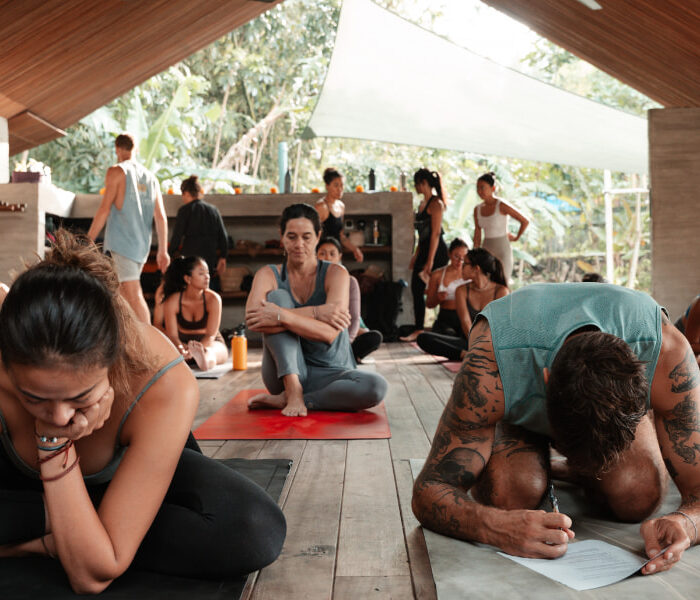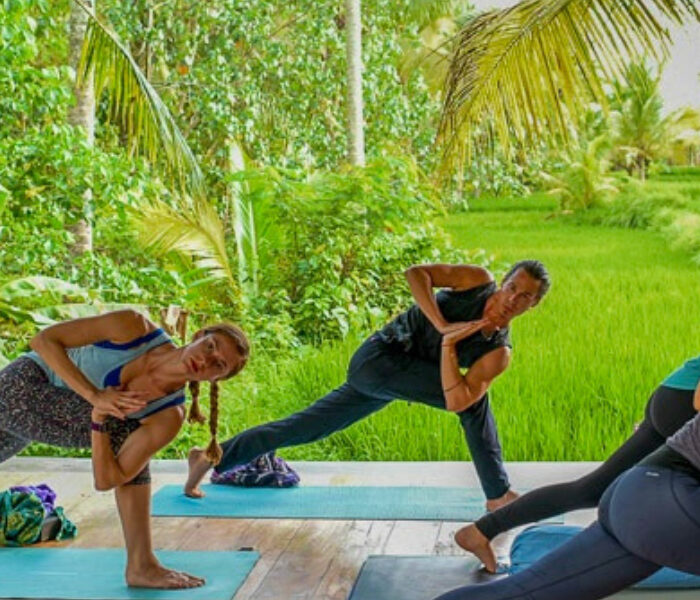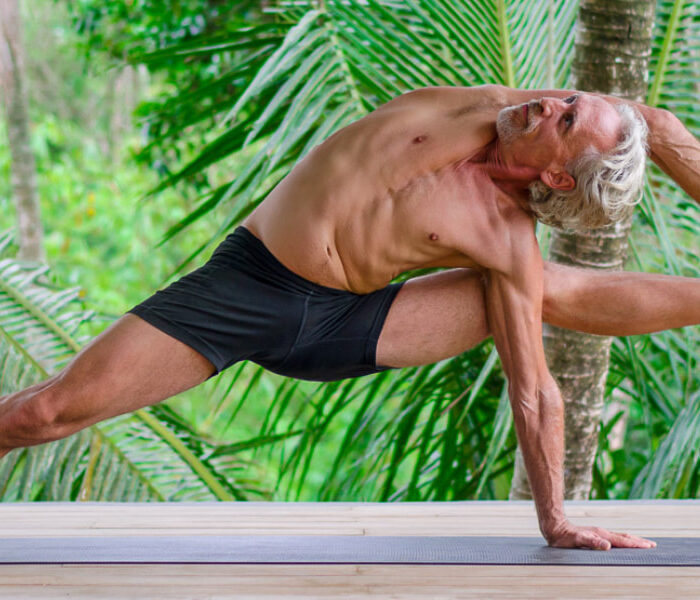The best places to stay during your Bali YTT : Canggu to Ubud

“A change of scenery can change your soul.” That’s what my teacher whispered during savasana in week three of my YTT in Bali right before a thunderstorm.
I came to Bali for a 200-hour yoga teacher training (YTT) with a mat, a backpack, and no real idea where I was headed. I didn’t know if I was choosing the right yoga school, let alone the best place to stay.
And as it turns out ? Where you sleep matters just as much as where you practice.
If you’re searching for the best places to stay in Bali during your YTT, you’re in the right place.
When planning your journey, it’s just as important to find the best yoga teacher training in Bali, choosing a top-rated program with a comprehensive curriculum and great value, will make your experience truly transformative, alongside the right accommodation.
This guide blends first-hand experience, verified research, and real talk designed to help you to find a space that supports your transformation from Canggu to Ubud (and even a few hidden gems).
Most 200-hour yoga teacher training courses in Bali cost between $1000 and $2500. Yoga teacher training in Bali attracts people from all around the world seeking spirituality and healing. Participants in yoga teacher training programs often report transformative experiences.
Ultimately, finding the best place to stay during a Bali YTT depends on your personal preferences, such as your desired environment, amenities, and lifestyle.
Why Bali is the ultimate destination for yoga teacher training?
Bali has evolved into one of the top yoga teacher training destinations in the world, renowned for its deeply spiritual atmosphere.
The island’s spiritual energy, rooted in Hindu traditions and authentic cultural practices, creates a transformative environment for immersive yoga experiences, not just the stunning beaches, mystical rice fields, or daily coconut rituals, though all those things help.
If you’re looking for a comprehensive overview of the best yoga teacher training programs available, be sure to check out our best yoga teacher training in Bali guide for detailed comparisons and expert insights.
Here’s why Bali is so ideal :
- Deep-rooted spiritual culture
- World-class yoga schools (Yoga Union Bali, The Yoga Barn, Radiantly Alive)
- Yoga Alliance-certified programs
- Integration of pranayama, mantra chanting, and yoga philosophy
- Affordable vegan and vegetarian food
- Wellness-focused communities and nature immersion
Bali’s unique environment and experienced teachers support students in gaining a profound understanding of yogic philosophy and practice.
The presence of renowned yoga teachers, many of whom are internationally recognized for their expertise, elevates the quality of training and attracts students from around the world.
Completing a 200-hour yoga teacher training course qualifies you to start teaching yoga. Many yoga teacher training programs in Bali offer accommodations and meals as part of the course package.
Yo ga teacher training programs in Bali typically take between 15 and 30 days to complete. Having at least 6 months of yoga practice is commonly recommended before starting a yoga teacher training course.
From vinyasa to yin yoga and everything in between, Bali has a program and a setting to match your energy.
Canggu vs. Ubud : Where should you stay during your YTT ?
When looking at places to stay in Bali for your yoga teacher training, you’ll probably land on two main areas : Canggu and Ubud.
Your choice between Canggu and Ubud may also depend on your preferred yoga style, as each area offers unique approaches and atmospheres. Ubud is especially appealing for nature lovers seeking immersion in Bali’s landscapes.
Both Ubud and Canggu are popular areas for tourists, offering unique charms and activities.
Canggu : beach vibes and social energy

Canggu is the surf-meets-yoga capital of Bali. It’s got beach cafés, smoothie bowls, coworking spaces, and a big international crowd, including digital nomads who flock here for the perfect blend of work and leisure.
If you love variety, action, and connection Canggu might be for you. Trendy cafes and beach clubs are popular spots for socializing, relaxation, and enjoying the laid-back yet vibrant beach scene.
Top yoga schools : Samadi Bali, Serenity Eco Guesthouse
Desa Seni in Baturity is famous for its yoga and health food, north of Ubud.
Canggu has become a hotspot for health-conscious individuals, with tones of trendy cafes and a vibrant wellness scene like Secret Spot (my favorite Vegan Restaurant in Bali so far) with two location, off Jl Berawa and the bigger one off Jl Batu Bolong and Matcha Cafe near the soccer field on Berawa.
Top places to stay :
- Serenity Eco Guesthouse: Walkable to the beach and daily yoga classes
- The Chillhouse: Vibrant, social, great food, and close to cafes
Canggu is also within reach of Bali’s unique black sand beaches, offering a different coastal experience for visitors, like Pantai Seseh or Tanah Lot.
It’s also known for its vibrant community events, from group yoga sessions on the beach to wellness gatherings that foster connection among locals and visitors.
Staying in Canggu provides opportunities for early morning surf sessions due to its proximity to the ocean at crowded Batu Bolong Beach, but you will also find teachers there starting as early as 7 am, right on the beach, just steps away from Old’s man.
Good to know : Canggu can be loud and busy. If silence is your thing, look for guesthouses a bit inland like on Jl Tumbak Bayuh wich is only 10 minutes away on a motor bike.
Ubud : tranquility, culture, and deep inner work

Ubud is the spiritual heart of Bali, offering a holistic environment for personal and spiritual growth.
It’s surrounded by lush rice terraces, dense jungles, and ancient temples making it a haven for those seeking spiritual introspection and inner peace.
The surrounding nature, including rice paddies, rivers, and jungles, greatly enhances the yoga experience by providing a tranquil and immersive setting.
Top yoga schools : Yoga Union Bali, The Yoga Barn
Many programs in Ubud include detailed instruction on breathing techniques as part of their curriculum, ensuring a comprehensive yoga education.
Ubud is considered the cultural and artistic heart of Bali.
Also has a thriving wellness community, offering Ayurvedic treatments and organic vegan cafes.
Top places to stay :
- Swasti Eco Cottages : Organic food, lush gardens, close to town
- Gusti Garden Bungalows : Budget-friendly and peaceful
Ubud is also home to some of Bali’s most renowned yoga studios, offering a wide range of classes and workshops.
Many yoga schools in Ubud focus on traditional styles such as Hatha, Ashtanga yoga with its structured primary series that forms a foundation for comprehensive yoga education and Vinyasa.
Ubud integrates traditional Balinese ceremonies and sound healing in many yoga instructor trainings.
Many yoga schools in Ubud incorporate traditional Balinese ceremonies into their programs.
Surrounded by nature, including rice paddies, rivers (do go rafting in the area of Saya, there are plenty of Rafting schools) , and jungles, enhancing the yoga experience.
Other Great Areas to Consider
North Bali
Great for: Peace, nature, authenticity, and deep rest, you can rest, do yoga and snorkeling and Dive in Pemuteran, about 3 hours from Canggu.
You can take the road through the mountain, longer to get there but saer than the main raod to Gilimanuk as there is a lot of traffic from trucks coming from main land Java.
Why go: Wayyyy fewer tourists, traditional temples, spiritual connection.
East Bali
Great for: Nature immersion, volcano views, especially Gunung Agun (3.5 hour hikes up and 3.5 hours down if you feel strong as it is not an easy hike), raw jungle energy.
Why go: Hidden waterfalls (our favorite one is in that area by the way, read our article to find out which one it is) , smaller retreats, and quiet villages
Gili Islands
Great for: Post-YTT recovery or casual practice and if you are younger than 50 as boats to get there are quite crowded, we prefer going to Nusa Lembongan as it is closer and less busy.
Why go: Beach yoga, coral reefs, no motorized traffic, snorkeling trips, you will have 97 percent chances to see wild giant utrles.
Gili Air stands out for its relaxed atmosphere, beautiful beaches, and excellent opportunities for snorkeling and diving and Gili Meno, the quietest one of the 3 islands there. (Our favorite)
Nusa Dua and surroundings

If your vision of yoga teacher training in Bali includes a touch of luxury, Nusa Dua and its surroundings might be your perfect match.
This area is renowned for its world class luxury resorts, private pool villas, and pristine, beautiful white sand beaches offering a tranquil escape from the island’s busier hubs.
Nusa Dua’s calm, upscale atmosphere is ideal for those who want to combine their yoga practice with relaxation and indulgence.
Many yoga schools and retreats in Nusa Dua are set within lush gardens or right on the beachfront, providing a peaceful backdrop for daily yoga classes, meditation, and deep introspection.
Nusa Dua’s holistic environment is perfect for students who value privacy, comfort, and easy access to both wellness amenities and the natural beauty of south Bali.
Whether you’re looking for a luxury resort with a private pool or a boutique hotel steps from the ocean, you’ll find accommodation options that support both your studies and your self-care.
Plus, with world class surf spots and day trips to nearby ancient temples, Nusa Dua offers a balanced blend of serenity and adventure for your YTT journey.
Spotlight : yoga schools and teachers in Bali

Whether you’re drawn to power yoga, vinyasa flow, or something more restorative like Yin, Bali’s yoga teacher trainings cater to all styles and backgrounds, with vinyasa yoga being a core style offered in many programs.
Many yoga schools in Bali are Yoga Alliance certified, ensuring global recognition.
In places like Ubud, Canggu, and Seminyak, you’ll find experienced teachers leading deeply immersive programs. Comprehensive teacher trainings in Bali place a strong emphasis on yoga asana practice, ensuring students gain practical skills across multiple styles.
Many also incorporate traditional Balinese ceremonies and holistic healing practices like sound healing, cacao ceremonies, and even ice baths, making each YTT feel unique, intentional, and aligned with the island’s healing energy.
How to choose the best accommodation for your YTT?
You’ll be practicing and studying over 8 hours a day, so where you rest is everything.
What to consider :
- Is it walkable to the yoga school?
- Will I get restful sleep?
- Is healthy food available or included?
- Are there fans or AC?
- Do I want the amenities and privacy of a luxury resort?
If your YTT school offers a housing package, that’s often the simplest choice. Less to coordinate = more time to breathe.
Accommodation options : from eco-lodges to luxury resorts
Whether you prefer lush eco-lodges or private villas, Bali has it all.
In Ubud and North Bali, you’ll find boutique hotels nestled in rice terraces with jungle views, perfect for deep introspection. In Nusa Dua and Seminyak, luxury resorts with pools and high-end wellness amenities offer tranquility and comfort.
Many retreats harmonize with nature and support wellness with healthy meals, quiet surroundings, and yoga shalas open to the elements.
Accommodation options for digital nomads
Bali has become a global hotspot for digital nomads, and if you’re combining your yoga teacher training with remote work, you’ll find plenty of accommodation options tailored to your lifestyle.
Areas like Canggu and Seminyak are especially popular, thanks to their central location, reliable Wi-Fi, and abundance of coworking spaces and trendy cafes.
Many guesthouses, boutique hotels, and private pool villas in these neighborhoods cater specifically to digital nomads, offering communal lounges, fast internet, and flexible workspaces.
You’ll find it easy to balance your yoga classes and teaching practice with your professional commitments, all while enjoying the vibrant community events and wellness scene that Bali is famous for.
For those who crave a holistic environment, some yoga schools and retreats even offer packages that include both yoga teacher training and coworking access, so you can stay productive without missing out on the transformative experience of your YTT.
Whether you prefer the buzz of Canggu’s (depends of your age I guess) beach bars or the peaceful atmosphere of a jungle villa, Bali’s accommodation options make it easy to design a stay that fits your personal preferences and supports both your work and your yoga journey.
Budget-Friendly options for YTT students (NEW)

If you’re embarking on a yoga teacher training in Bali on a budget, rest assured, there are plenty of affordable accommodation options that don’t sacrifice comfort or community.
Many students opt for guesthouses, hostels, or shared villas, especially in areas like Ubud, Canggu, and North Bali, where you can find clean, safe, and welcoming spaces close to major yoga schools and studios.
Look for accommodation that offers communal kitchens, free breakfast, or discounted rates for long-term stays. Booking with fellow YTT students can help lower costs and foster instant connections.
Some yoga teacher training courses also partner with local guesthouses to provide special deals or package rates, so be sure to ask your school for recommendations.
For the most budget-friendly experience, consider staying a bit further from the main tourist areas, places in northern Bali or smaller villages often offer lower prices and a more authentic Balinese culture experience.
No matter where you stay, you’ll be surrounded by the island’s natural beauty and have easy access to yoga classes, vegan meals, and the supportive community that makes Bali such a special place for personal growth.
Local culture : immersing yourself in Bali’s spirit
Yoga in Bali is more than postures, it’s cultural immersion. From morning offerings to temple ceremonies and community rituals, you’ll witness spirituality embedded into daily life.
Many YTT programs include excursions to sacred sites or invite local priests to bless the training. These moments offer an embodied understanding of yoga beyond the mat.
Food and wellness : nourishing your body and mind

You’ll eat well here. Really well. From smoothie bowls and fresh tempeh to Ayurvedic curries and herbal teas, Bali caters beautifully to plant-based diets.
Ubud in particular is known for its organic vegan cafés, juice bars, and herbal apothecaries.
Beyond food, you’ll find sound healing, massage, and daily breathwork available at most major centers. Many YTTs also include meditation, yoga nidra, and ice bath recovery sessions.
Activities and excursions : exploring Bali beyond the mat
Between classes, explore Bali’s wonders, take a surf lesson in Canggu, trek Mt. Batur at sunrise, or visit the ancient Tirta Empul temple.
You can island-hop to Nusa Penida or escape to the Gili Islands for snorkeling and beach time. The Nusa Islands are also a popular day trip or extended stay option for those seeking adventure and quieter beaches.
Many programs build these excursions into their schedule to balance intense study with joy and movement, and you can also experience Bali’s wellness culture through yoga retreats in addition to teacher training.
Community and networking : building connections during your YTT
One of the most rewarding aspects of joining a yoga teacher training in Bali is the vibrant community you’ll become a part of.
From the very first day, you’ll be surrounded by like-minded individuals from around the world, all drawn to the island for self discovery, learning, and transformation. The shared experience of intensive yoga practice, teaching methodology, and deep introspection naturally fosters strong bonds and lifelong friendships.
Many yoga schools in Bali organize community events, group excursions, and collaborative workshops, giving you plenty of opportunities to connect with fellow students, experienced teachers, and local practitioners.
These connections often extend beyond the training itself, leading to future collaborations, teaching opportunities, and a global network of support.
Whether you’re practicing vinyasa flow at sunrise, sharing vegan meals after class, or exploring the famous Tegallalang rice terraces together, the sense of community is ever-present.
Bali’s open, welcoming spirit makes it easy to find your tribe and build relationships that will support your journey as a yoga teacher long after your YTT ends.
Personal growth and development : the inner journey of a Bali YTT
Beyond the asana, anatomy, and teaching practice, a yoga teacher training in Bali is a profound journey of personal growth and self discovery.
Immersed in the island’s deeply spiritual atmosphere, surrounded by lush rice terraces, ancient temples, and the sounds of nature, you’ll find space for deep introspection and transformation.
Bali’s yoga schools are known for weaving yogic philosophy, mantra chanting, and meditation into their programs, encouraging students to explore not just the physical practice, but also the mental and emotional layers of yoga.
The supportive environment, experienced teachers, and daily rituals help you cultivate resilience, compassion, and a deeper understanding of yourself.
Many students leave their YTT with more than just a certificate, they gain clarity, confidence, and a renewed sense of purpose.
Whether you’re seeking to become a yoga teacher or simply to reconnect with your authentic self, the inner journey you embark on in Bali will stay with you long after you leave the island, shaping your practice, your teaching, and your life.
Real talk from real yogis

“Bring electrolytes. Coconut water saved my life,” one trainee joked.
“Don’t overthink it. You’ll spend most of your time barefoot anyway,” said another.
As for me: I didn’t stay at the fanciest place, but it was quiet, clean, and five minutes from class. That made all the difference.
One of the most valuable aspects of YTT is the teaching practice, where students gain real-world experience and receive feedback to develop their teaching skills.
If you’re looking for more inspiration from people who’ve experienced the transformation firsthand, read our collection of Bali’s transformative magic, where former students share their life changing journeys and lessons learned during YTT.
What to pack for a 200-Hour YTT in Bali
- Lightweight clothing (cotton, breathable)
- Yoga mat (unless your school provides one)
- Reusable water bottle and bug spray
- Journal and pens
- Flip flops, sneakers
Leave heavy books, tight jeans, and hair dryers at home.
If you’re unsure about what else to pack for a Bali YTT to ensure you’re fully prepared for both yoga practice and your spiritual journey, check out our guide on packing your soul bag for a more comprehensive list of essentials.
Cost, timing, and visa tips
- Most YTTs cost $1000–$2500 USD (with food + lodging)
- Courses run 15–30 days
- Best months: May–September (dry season)
- Visa: Under 30 days = Visa on Arrival; longer = B211A tourist visa
Book early. Spots and rooms fill up 3–6 months ahead.
FAQs
Yes. Many schools welcome all levels, as long as you’re committed to growth
Yes. Stay alert and use standard travel smarts.
Vinyasa, power, yin, ashtanga, aerial, and restorative styles are common. Many schools blend disciplines.
For nature and quiet: Ubud.
For surf and cafés: Canggu.
If you’re not sure go with your gut. It usually knows.
A YTT trains you to teach; a retreat offers rest, introspection, and healing. Bali excels at both.




